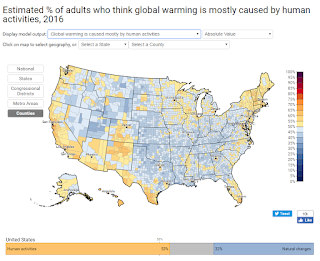Recently, the Yale School of Forestry came out with a new
data visualization for the United States. It’s called the Yale
Climate Opinion Maps – U.S. 2016. This new map has a drop-down list of different kinds of questions regarding climate change beliefs, risk perceptions, policy support, and behaviors. You can change different aspects of the map to look at these questions and how they vary across the country, states, or other subdivisions.
For certain questions, like the one pictured above ("global warming is happening"), the map may look a bit homogeneous, which is reassuring -- the redder the color, the higher the percentage. But go just one down on the drop-down menu ("global warming is caused mostly by human activities"), and you might get something a bit less exciting...
The tool is a fun, useful visualization, but I'm writing about it now because it actually highlights a framing issue that I believe many Americans fall victim to. This map below expresses the response to the prompt "global warming will harm me personally." It's pretty blue, huh?
But if we tweak the question just a little, to, say, "global warming will harm people in the U.S.," we get a very different map.
So the situation we have here is this: respondents, who live in the United States, generally do not believe that global warming will harm them. However, these same respondents generally believe that global warming will harm people within the United States. Seeing as it's not a regional thing, there's something going on here. And that something is a framing issue.
Climate change is typically seen as a "distant" issue for people in the United States. They feel that the issue will affect people who are further away (spatially distant) and/or future generations (temporally distant). Basically, they feel like it will effect everyone except them! So how do you motivate a population that thinks they won't be affected by climate change, even if they think their neighbor might be?
Luckily, an issue of framing can be solved by framing! Too often today, we see climate change communicators presenting the parts about climate change that belong in movies like 2012 or Mad Max: Fury Road -- the flooding, droughts, extreme weather events. They're trying to get people to realize how dire our situation is, but these scare techniques can make a person feel helpless. And while the evidence for climate change may be stacking up, if people are scared by it, they're going to keep distancing themselves from the issue like we see here.
So if you want to try to get people to acknowledge reality and realize that they will be impacted by climate change, try promoting efficacy. It's like what Ray's always saying in class -- the declarative knowledge isn't as important. It's the procedural knowledge on how to get it done. When someone feels like they can do something about it -- when they feel like their individual actions will really help mitigate the problem in some way -- they will be more motivated to do something about it (Dickinson et. al., 2013).
As for the Yale map, I suggest you go play around with it a bit -- it's really an interesting tool!
Sources
Dickinson, J. L., Crain, R., Yalowitz, S., & Cherry, T. M. (2013). How Framing Climate Change Influences Citizen Scientists’ Intentions to Do Something About It. The Journal of Environmental Education, 44(3), 145-158. doi:10.1080/00958964.2012.742032




No comments:
Post a Comment